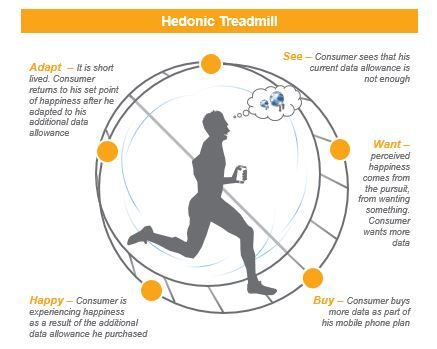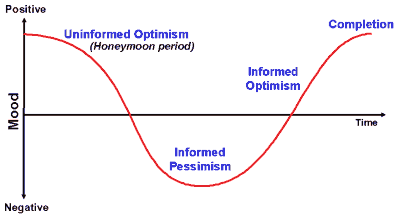The Treadmill
It start innocuously enough. The new parents coo at the baby’s success in rolling over. A major milestone checked off the child development list. A passing comment about so-and-so’s daughter still not standing up. The father checks off the questionnaire during the 9-month well-child care visit at the pediatrician and feels relieved that the baby is doing well. Maybe more than well – great.
We arrive in this world unsure and unmoored. Somehow for a new baby this isn’t a problem. The needs are simple and straightforward. Food and sleep. The world is still an unfocused and fuzzy mess.

Orienting in the world requires reference points. The map of our early life is centered around our family. Imitation it turns out is a crucial tool for how we learn everything. From understanding how to physically manipulate objects to navigating social dynamics we mimic, copy, and extend what we see. As one parenting advice puts it: The secret to raising kids is simple.
Be the person you want your kids to grow up to become.
Parenting Advice
And thus the treadmill begins. From comparisons in the playground to standardized tests our reference to how we’re doing appears in contrast to what our peers are doing.
We’re perpetually looking for what’s next
Called the hedonistic treadmill. We’re looking for the next thing. Peaks require bigger peaks. Why do people who have a billion dollars still continue to push hard.
The Discovery
Somewhere along the road we discover that we’ve traded our time for money. And the ultimate point for money was to (“Dalai Lama quote”)

Perhaps this discovery comes from some disappointment in our lives. If we’re lucky we get what we wanted and realize that it doesn’t provide the lasting happiness we thought it would.
Hedonistic Adaptation
We think getting something makes us happy and it does for a while. But eventually we adapt to it and it no longer gives us that joy.

The disillusionment
We start to see that perhaps the path that everyone is on isn’t going to get you there. Once again we look out to see who is happy.
The Path
At this point we begin to sample various paths. In the past there might have been limited options. But today a web search for “the meaning of life” reveals 1.9B results. Everyone seems to have an opinion on the answer. Science has tons of research on this topic. Go for experiences it says. Have close relationships. But these seem like statistical inferences – not the feeling or experiential happiness that we seem to be seeking.
At some point you’ve found your way to meditation. It fits the needs for the independent do-it-yourself thinker. It seems to have a simple premise. Our minds are an untamed chaotic mess. After all we’ve now learned the benefits of physical exercise and its impact on physical health. Similarly meditation is akin to mental exercise we think.
For many the unruliness of the mind is a sign there is nothing there to find. For some a realization dawns. Perhaps this was the source of the confusion and suffering. The diagnosis is simple. We suffer because we attach to outcomes. We attach to outcomes because of our untamed minds. Science seems to validate this approach. We learn about the default mode network of the brain. They tell us that this group of brain regions kick into gear when we’re not engaged in an activity like paying attention. That it’s correlated with mental disorders like depression, anxiety, and schizophrenia. Activities like meditation lead to reduced activity in our default mode network.

In the beginning we are buoyed by the implication of the new path. If we were to just cultivate our efforts to tame our mind we’d no longer be buffeted by the whims and vagaries of a unfocused and reptilian brain.
Elephants
One model of our mind says our subconscious is like an elephant – vast and unknowable it’s drive by automatic behaviors and limited patterns. Our conscious brain is the like the rider on the elephant seemingly in control, but just a random distraction away from being a scared witless rider.

Catching the thief in action
Somewhere in the honeymoon period you see the heist as it is taking place. You remain focused on the object of your meditation (in most cases the breath) when you see a thought arise and snag your attention. Like a water-skier being haplessly dragged through the water (face first) you find yourself yanked through the painful territory. Let go of the rope you want to yell. But in the midst of this scene it dawns on you that you’ve seen through the drama. The story then is that if you just happen to catch the story sooner you’ll be set. Thus begins the journey to the next stage.
The quest into the valley of despair
We follow this uninformed optimism deeper into our meditation practice. Unbeknownst to us we are descending into the second stage of any change: the valley of despair. For many people this ends with a familiar narrative.
“I wish I had more time to dedicate myself to this path”
“I never stick with anything”
Some of these are attributed to the environment. I wish I had encountered this path before I <insert situation: had kids, took on a mortgage, etc>. Alas I have to make do with what I can do.
But for the lucky (or perhaps unlucky ones) they do find sufficient time to commit to the practice. They pursue the path with abandon. Residential retreats. Morning and evening meditations. They look approvingly at their insight timer stats. Minutes rack up. Hours rack up. Wrists now have beads. Their phones chime at random intervals in an effort to be mindful at all times of the day. Bookshelves fill with books on how to bring mindfulness to all manner of activities. From child-rearing to running, mindfulness is the magic potion that clears all obstruction and has no calories.
As we sit patiently, we notice how the patterns of our lives continually appear. We spot the origin and the result of these thought loops. We hear about the idea of enlightenment. Perhaps there is something to this. Perhaps in the eastern tradition they really had figured this out. While late to the party, we’re no slouch. We’ll run up this hill.
Now the weeks turn into months and sometimes years. In time the juice starts to run low. This terrain seems desolate. How long has it been since the last epiphany? Physically we adapt to the needs of meditation. The struggle of a 20 minute sit is now rarely encountered. A 10-day might now sometimes engender the same difficulty. There is a sneaking suspicion we’re just getting good at sitting still.
Note: Spiritual Materialism – Chogyam Trungpa
The wakeup
The rationalization begins. In the beginning it felt like we were getting samples of what this path would bring us. They felt like little hints that we were on the right path. But now those are but fading memories.
Perhaps we need at least 10,000 hours. Aren’t we judging this a little too soon? There are many quotes for this stage.
“Enlightenment is an accident. Practice makes us error prone”
Our old friend, cognitive dissonance reappears. “Imagine how much worse I would be if I didn’t have a meditation practice” .
We are so used to believing our failure that we don’t question the practice. Could it be that the path we’re on is pointed in the wrong direction?
The trouble is that we’ve been on this path for a while. We’ve bought the gear. We’ve sold ourselves and our external world. Like a groove that’s been set we now believe in it. The shortcomings now are ours and not that of the path. Starts to sound like religion.
Legend has it that the Buddha similarly gave his all to the pursuit of asceticism (the practice of the time that was supposed to enlighten). When he had starved himself to the point where he could see the bones of his spine through his stomach he despaired knowing he had given his all. Thus began his turn back towards the “middle way”.
- But then a sneaking suspicion arises in our mind. Am I really getting any closer. How long has it been since the last epiphany? Am I deluding myself? Is this a religion for me that I follow unquestioningly? Are the people I’m around really there?
- What am I looking for really? Does anybody know? What is over there? I think I’ll know it when I see it. But will I?
- There is a story of the person who looks for his car keys under the street light instead of where he dropped them. It seems brighter and easier to look he thinks. Are we much different? We seem to be looking for meditation assuming it to look like X but what if it’s really Y. Like the beggar looking for alms but holding out a gem encrusted gold bowl we miss something.
- Do the so-called teachers really know? Is this any different that religion?